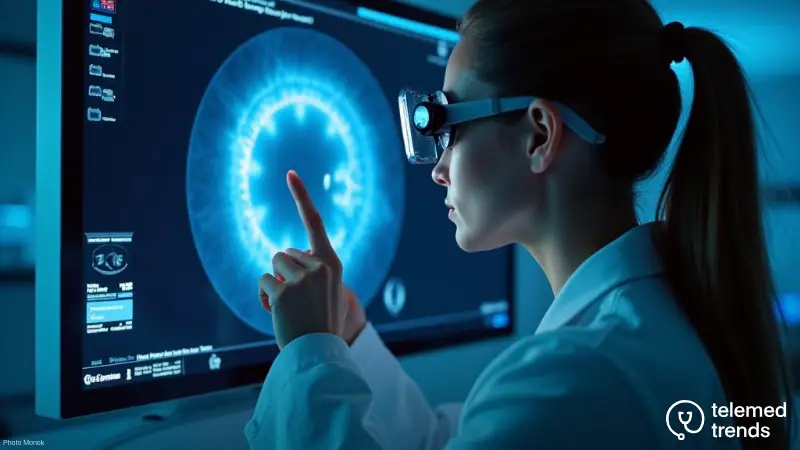Vitazi.ai, a top player in eye health technology, has teamed up with Eye Associates of New Mexico. They’re working to catch diseases early using AI and eye exams. This could make doctors’ work more accurate and help patients get better care worldwide, a big win for health technology.
Key Takeaways
Vitazi.ai partners with Eye Associates of New Mexico to apply AI in eye exams for early detection of conditions like heart disease, diabetes, and Alzheimer’s.
- The partnership aims to leverage OculoInsights™, an AI tool that analyzes retinal images to identify early signs of systemic diseases.
- This technology can help prevent serious health issues by enabling earlier intervention and treatment.
- Vitazi.ai plans to expand its diagnostic capabilities beyond eye care to include a variety of chronic conditions.
Eye Associates and Vitazi.ai partnership
Eye Associates of New Mexico is the biggest eye care provider in the state, with 11 clinics, three surgery centers, and 10 optical shops. They help around 1,400 to 1,500 people every day. By joining forces with Vitazi.ai’s smart tech, they aim to use eye images to find early signs of diseases like heart issues, diabetes, and brain disorders.
👁 https://t.co/ds2F3nI054 |📍 Santa Fe, NM#Computer #vision detects and prevents diabetes-induced vision loss. Saving thousands of people's vision annually. (4/7) pic.twitter.com/HNSwnaHiS8
— NVCA (@nvca) July 18, 2023
The key part of this plan is OculoInsights™, a powerful AI tool from Vitazi.ai. It checks eye images for signs of problems like Alzheimer’s, high blood pressure, and metabolism issues before they show up physically. This partnership will create a huge collection of data, helping Vitazi.ai improve their tech and offer more features.
Dr. Jeremy Stueven, founder and CEO of Vitazi.ai, highlighted the importance of this partnership. He believes AI-driven eye exams can change how diseases are found and prevented. The aim is to make this tech available to doctors everywhere so they can spot diseases early and treat them before they cause problems.
Revolutionizing early disease detection
The growing use of artificial intelligence in healthcare is creating big changes, particularly in the area of Oculomics. This involves using AI to study the retina and spot systemic diseases early. AI can look at retinal images and find small changes that suggest health issues before symptoms even show up. This early detection is revolutionary because it lets doctors catch diseases like heart problems, diabetes, and Alzheimer’s early, when they’re easier to treat.
One of the great things about retinal imaging is that it’s non-invasive. Unlike tests that might need blood samples or surgeries, retinal scans can give important information without causing discomfort. AI can examine these scans and find early signs of illnesses, such as diabetic retinopathy, which can go unnoticed until it’s too late. In 2021, the CDC noted that around 9.6 million Americans had diabetic retinopathy, usually discovered too late to stop major damage.
Dr. Jeffrey Wigdahl, CTO of Vitazi.ai, is leading the project on OculoInsights™, a platform that uses AI to find such health issues at the earliest stages. This technology employs machine learning to review several medical images over time, spotting minor changes that could be missed otherwise. Vitazi.ai aims to change disease diagnosis by focusing on preventing problems instead of just reacting to them.
AI is the future
We are thrilled to share Dr. Stueven’s interview. https://t.co/hes0tkAKCd is revolutionizing the emerging field of Oculomics with its AI-powered OculoInsights platform. Their proprietary platform uses both artificial intelligence and Board-Certified teleretinal…— Vitazi.ai (@VitaziAi) January 30, 2025
Stueven, who has experience as an ER doctor, started Vitazi.ai to address degenerative eye diseases like diabetic retinopathy, which often occur because of long-term high blood sugar leading to blocked blood vessels in the retina. These blockages can cause vision problems but usually aren’t noticed until serious damage happens. Stueven’s aim is to provide AI diagnostic tools to primary care doctors, helping them identify diseases sooner to enhance patient care.
Vitazi.ai’s role in healthcare innovation
Vitazi.ai started in New Mexico and is part of the state’s growing role in bioscience. Dr. Jeremy Stueven, who used to be an emergency room doctor, wanted to create medical technology that makes a difference. He was helped by Stuart Rose, who founded the BioScience Center in Albuquerque. This center offers space and labs to new biotech companies, providing the needed support to grow.
The BioScience Center, found near San Pedro and I-40, includes over 30 offices and 10 labs. It’s been key to helping companies like Vitazi.ai start and grow quickly. Rose mentioned that companies like Vitazi.ai play a crucial part in New Mexico’s economy by creating jobs and advancing new medical technologies.
Right now, Vitazi.ai is testing a diagnostic machine that uses AI to study medical images over time. This process, called machine learning, helps discover small changes that might show the early signs of diseases like diabetic retinopathy, heart disease, and neurodegenerative disorders. Finding these early can greatly improve patient care by allowing quicker treatment.
Vitazi.ai’s future plans go beyond eye-related health. Stueven hopes that AI diagnostics will be common in all primary care. This means doctors could use these tools in their offices to spot many health issues, from diabetes to Alzheimer’s disease. This change would improve the quality of care and cut healthcare costs by spotting diseases before they become more serious.
As Vitazi.ai and Eye Associates of New Mexico team up, the promise of AI in early disease detection shines brighter. Together, they are enhancing the OculoInsights™ platform to broaden its diagnostic abilities.
Early disease detection is crucial. Many chronic illnesses, like diabetes and heart disease, often go unnoticed for years, causing serious damage by the time they’re found. With AI-powered retinal diagnostics, doctors can catch these conditions early, possibly saving lives and avoiding long-term issues.






